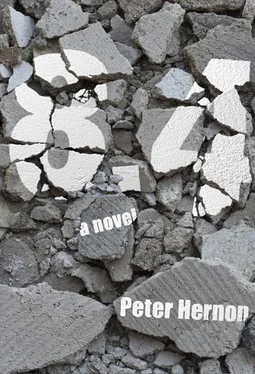“The mainshock must have created the waterfall on the Mississippi,” Holleran said.
“It’s still there,” Jacobs said. “We just downloaded some aerial footage from one of the television networks. The scarp looks thirty feet high.”
“It was closer to forty the night before last,” Atkins said.
“It could be eroding.” Jacobs said. “It happened in the 1811-1812 sequence.” He turned on the lights and pulled down a wall map that showed the Mississippi River, twisting like a snake with a dark line drawn across it just below New Madrid, Missouri.
“That’s where the waterfall was reported after the 1811-1812 earthquakes. You’ll notice Caruthersville, where John and Elizabeth crossed the river. It’s about fifty miles downstream, the place where the new fault breaks off into Tennessee. The waterfall in 1812 was created by a thrust fault. It was probably the greatest mid-plate thrust earthquake we’ve ever had—until the one yesterday.”
Holleran had never been so tired in her life. And yet she found herself wide awake, totally focused on the discussion. “What if that magnitude 7.1 event we had a few days ago wasn’t the first earthquake in the sequence?” she asked. “What if it was just a foreshock?”
Atkins remembered they’d argued over that very point when they were huddled in the Explorer near Blytheville. He wasn’t about to argue with her this time. The GPS data had convinced him that what she was suggesting was a real possibility.
Jacobs had already considered it. “I don’t think that’s likely,” he said, becoming more animated. “A magnitude 7.1 earthquake is one hell of a foreshock.”
Unwilling to let go of the idea. Holleran said, “One of the toughest issues we deal with is trying to figure out if an earthquake is a foreshock or an aftershock. We don’t really know for sure until you get a major earthquake. The magnitude 7.1 event, it seems to me, could easily have been a foreshock to the big quake we had yesterday. But say I’m wrong and you’re right, Walt. It could mean we’re in for one more big one instead of two. Either way, it’s a disaster.”
“I don’t want any more talk about a triple,” Weston said angrily. “You’re both bordering on irresponsibility.”
Again, there were loud murmurs of support. Most of the seismologists in the room, like Weston, were convinced that definitive data was still lacking, that it would be folly to try to predict another massive quake. Weston was voicing the majority opinion. He’d done so with increasing support since the crisis had started.
Holleran went on. “From what I’ve read, triples aren’t all that unusual in intraplate settings like the one here. There were triples as recently as 1990 in the Sudan. The largest was a magnitude 7.3. The smallest a 6.7. They hit over a five-day period. In 1988, a rural area in Australia recorded three in the magnitude 6 range over a twelve-hour period.”
“We’ll have a panic on our hands if it leaks out we were even having this discussion,” Weston said. “We don’t need mass hysteria.”
“I’d say we already have it,” said Holleran. “How can we scare people any more than they already are?”
MEMPHIS
JANUARY 15
7:00 A.M.
PRESIDENT NATHAN ROSS STARED AT HIMSELF IN the mirror in the closet-sized galley of Big Green, the VH-3D Sikorsky based at Camp David. He was a depressing sight. The dark puffy rings under his eyes had been there for days and seemed to get deeper with every additional hour he went without sleep.
He’d never liked his five-o’clock shadow. It was too heavy, too much like Richard Nixon’s. And well into his second term, he sometimes thought he was almost as unpopular. His administration had been plagued by a series of domestic difficulties—worsening race relations, the increasing bipartisan sniping over affirmative action programs, yet another Medicare crisis, and the ever-present budget deficit. Very little of substance had been accomplished. Unable to find sound bites in the mire of such complex issues, the media had inevitably turned to his personal life. Much of the recent news coverage had dealt with the few women he’d invited to the White House for dinner or taken out for an evening to the National Gallery. A widower, he hadn’t dated for years and suddenly found himself fair game for the tabloids.
The youngest governor in the history of Illinois, Ross was also the youngest president. He was fifty-two with two years to go in his second term. In some respects he’d been lucky, damn lucky. The economy had been robust for most of his presidency. There’d been no major international crises and his party still controlled Congress.
No major problems—until this one.
His national security adviser had called the disaster the gravest crisis the country had faced since the Civil War. Ross hadn’t believed him. Not even when he sat in the NSC operations office in the basement of the East Wing and watched the early television reports from the cities hardest hit. Filmed at night, the footage mainly showed fires burning. After a while, it all looked the same. There was no perspective, no focus.
But after visiting these cities in daylight, Ross thought his adviser, a vituperative former marine, had nailed it with his Civil War analogy.
They’d made three stops the day before: Cincinnati, Louisville, and St. Louis. He’d spent a couple of hours on the ground in each city. The extent of the devastation had made him physically sick, in St. Louis especially. He’d been there several times on fund-raisers. The famous Gateway Arch, the monument to westward expansion that had towered 660 feet over the Mississippi River, was twisted sideways and leaned toward the river at a forty-five-degree angle. Three of the city’s largest hospitals had been demolished. Forest Park and Tower Grove Park were being used as tent cities for the thousands who’d had to move out of their damaged homes.
Ross remembered the bodies they’d removed from one of the hospitals. More than two hundred of them lined up along a sidewalk under blankets, sheets, newspapers—any covering the rescuers could find. Again, he thought of the Civil War. A photograph of the dead piled up at Gettysburg, lying shoulder to shoulder in the grass, blue and gray alike. There was no way they could reach all of the dead, much less the injured.
The heart had been ripped out of the Mississippi Valley. Eleven major pipelines that carried oil and natural gas from the Texas and Oklahoma fields to the East Coast had been shattered. Nine of them crossed the Mississippi at Memphis or just south of it. Some of the pipes were still burning. The whole waterfront was on fire.
The East Coast and frigid New England had enough petroleum reserves to last barely a week. Temperatures were well below freezing. In a few days, millions of people were going to be hurting in ways that couldn’t be imagined.
There were other problems, all of them grievous:
Grain shipments couldn’t flow down the Mississippi. Fallen bridges had closed the river to barge traffic in eight places.
The financial and bond markets were a shambles. Wall Street had suspended trading indefinitely.
The insurance industry had been all but wiped out. There was no way they could cover all the losses from the earthquake and related damage. They’d started calling in their bonds, which of course wiped out the bond market, which in turn financially ruined hundreds of municipalities that depended on bonds to fund all manner of public works.
And yet all of these problems paled when Ross remembered those mangled bodies in St. Louis.
He wondered what it would be like in Memphis. He’d been told to prepare for the worst.
Ross splashed water on his face. He was a handsome man with light gray eyes, a strong jawline, and black hair graying at the temples. He was just over six feet tall, a little overweight, and prone to overeating. He’d swum thousands of laps in the White House pool to hold the line at a thirty-eight-inch waist. He had to admit, staring at himself one last time in the mirror, that he looked like hell.
Читать дальше












